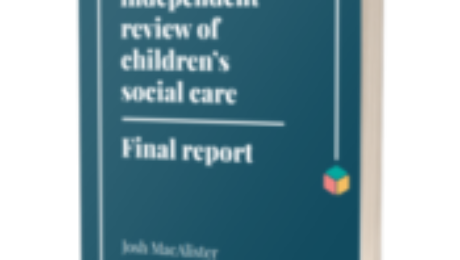ICO takes action against 7 Organisations
Action has been taken against SEVEN organisations who failed in their duty to respond to information access requests.
The Information Commissioner’s Office (ICO) has taken action against seven organisations who have failed to respond to the public when asked for personal information held about them, known as a Subject Access Request (SAR).
To read the story on the ICO website and find out which organisations were at fault click this link.
- Published in General
ACRCG commentary on the Care Review: a missed opportunity?
The Department for Education set up in July 2022 a National Implementation Board as part of the government’s response to the Care Review. At the time of writing this post, the current Prime Minister has not appointed a children’s minister but we assume this person will chair the Board. The Children’s Commissioner, together with the current president of the Association of Directors of Children’s Services, are included among the board members. The DfE has said that the board will have three additional members with direct experience of the care system, to be appointed ahead of the first full meeting in the autumn. Josh MacAlister has been given a contract to advise on the implementation of the review that he led as Chair. The previous administration said it would report on implementation proposals before the end of the year: however, it is possible that will now slip over into 2023.
Our colleagues in the Care Leavers Association (CLA) have commented on the review and we endorse their views. CLA says whilst welcoming that the review proposes the right to support for care leavers accessing their care files should be lifelong, this should not been seen through the lens of mental health issues alone. The right of care leavers to have access to their care records must sit alongside a life long duty on local authorities to deliver lifelong care for their population of care experienced adults.
The Care Review Report at p173 discusses the issue under the heading ‘Provision of Mental Health Support to Care Leavers over 25 Accessing their Care Files’. Both ACRCG and CLA strongly believe that post care support should not be restricted to ‘mental health’ concerns, with its potential for stigmatising care leavers. In our experience, in the vast majority of situations, adult care leavers simply need advice, follow-up support and guidance that is unrelated to any mental health issues. In fact, mental health should not be listed as a reason for providing support as it reinforces negative pathways to access support services and, in effect, directs the care leaver away from the local authority and into health services.
There are many more issues – for example, searching for knowledge about family connections,
identity and simple fact-finding – that merit support far more than alleged mental health concerns.
Such concerns have, historically, been used as a reason for to deny or restrict access to case
records either completely or to justify severe and unnecessary redaction. This ‘stereotyping’ of care
experienced adults who have the legal right to find out what personal data about them is on care
records is at best unhelpful and, at worst, yet another way of marginalising the rights of care
leavers.
What is actually required?
The 2014 revision of the Children Act 1989 guidance and regulations (Vol.3: planning transition to adulthood for care leavers’) makes clear (pp.37-43) what care leavers up to the age of 25 can expect and are entitled to. At the heart of this guidance is the clear message that “local authorities should provide services that consider the welfare of the care leaver, taking into account the implications of the decisions and actions for the care leaver and anyone else involved.” (p.39). But this guidance has its limitations.
ACRCG working with the CLA was instrumental in achieving a significant revision to the guidance and, at the time, was disappointed that, for legal reasons – this revision arising from amendments to children’s legislation – such guidance could not be extended to care leavers over the age of 25. However, the document clearly expects “the principles of good practice on accessing records to apply to any care leaver regardless of age”. In our experience, local authorities seem to be unaware of this guidance and, likewise, Ofsted does not see this as a performance standard when inspecting local authority practice and compliance.
So what does ACRCG and CLA say is now required? We believe that the Care Review missed an opportunity to recommend that the statutory guidance should be the basis for adult legislation that puts support in accessing care records at the heart of the duty on a local authority to set out its lifelong support offer. This support is so much more than a ‘mental health’ issue.
Alongside this, guidance should address the issue of the redaction of care records, which arises from the records coming within the remit of data protection legislation. This legislation has been helpful in ensuring access in recent decades. However, it is unsuited to the complex nature of care files. Frequent – and frequently excessive – redaction of data on care files causes delay in releasing data and a great deal of unnecessary distress to many care experience people seeking to make sense of their background, identity and experiences in care. These fundamental needs are far more important to the majority of care experienced adults who want access to their files.
The Care Review did not address the failure of local authorities to address the Article 8 rights of care experienced adults. Local authorities do not give sufficient weight to their legal duty under Article 8 of the Human Rights Act 1998 to ensure that decisions made when replying to a Subject Access Request [SAR] properly take into account the right of respect to family life that the person making the SAR has. Too much weight is given to third party privacy rights and local authorities too often exercise their discretion to share information without consent in a way that does not address the rights of the care experienced adult.
What is needed now?
For this reason, ACRCG and CLA are seeking firstly an amendment to current data protection laws to create a ‘defence’ of ‘justifiable and reasonable’ sharing of personal data without the consent of the person to whom the data belongs. Secondly, we continue to argue that there is a responsibility on the State to legislate for dedicated access rights together with guaranteed support consistent with the role the State had when it intervened in that person’s family life creating a life long alteration to their family life and their family connections.
- Published in General
Briefing Document jointly compiled by ACRCG & Care Leavers Association for Experts by Experience
The Care Leavers Association and the Access to Care Records Campaign Group worked together on a briefing document for the Board of the Experts by Experience members about the problems and impact of the current ‘care-less’ system when a care experienced adult asks a local authority for information from their care records. The members of this Board are tasked with ensuring that the Chair of the Care Review, Josh McAllister, takes into account throughout the enquiry and in its findings, the lived experiences of children, young people and care experienced adults.
The link to this group is here
Our briefing document is here
- Published in General


